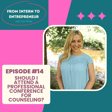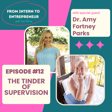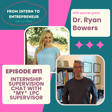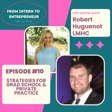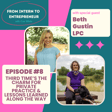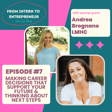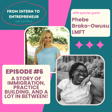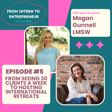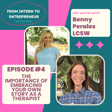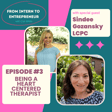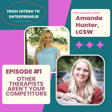
Episode 2: Therapy As A Second Career and Taking Action with Diana Liao
From Intern to Entrepreneur is the podcast for counseling graduate students (and other grad students in mental health fields) to start planning their journey to private practice while they're still in graduate school! Host, Cori White, started planning her journey while she was still in her graduate program and it paid off BIG to start planning EARLY.
In this episode of From Intern to Entrepreneur, Cori interviews Diana Liao. They talk about therapy as a second career (being a "career changer), being flexible and smart as an entrepreneur, taking action, and being a travel therapist!
About Diana:
Diana Liao is a licensed psychotherapist, coach, and corporate speaker from NYC. She helps adults in New York and beyond navigate challenges related to life transitions, identity, self-worth, relationships, and career. She's particularly passionate about working with diverse populations, including the Asian, Pacific Islander, and South Asian (APISA) communities, and works with them on issues of belonging, marginalization, and other complexities that arise from living in the US as a minority. She is also a co-founder of Bridges Mental Health (@bridgesmentalhealth), a mental health directory and therapist community for Asian, Pacific Islander, and South Asian Americans. Along with the Bridges team, Diana co-hosts "Beyond the Couch," a weekly podcast exploring Asian American mental health and identity.
Prior to practicing therapy, Diana worked in advertising, marketing, and photography. Diana has found that her own winding path has given her a unique perspective and ability to connect with different people and their struggles.
Diana has been working remotely since 2022 and slow-mading her way through Mexico, France, Southern Italy, Taipei, Cape Town, Croatia, and now Montenegro. Next up on the list: Valencia, Spain!
To connect with Diana, follow her on instagram at @therapywithdiana!

